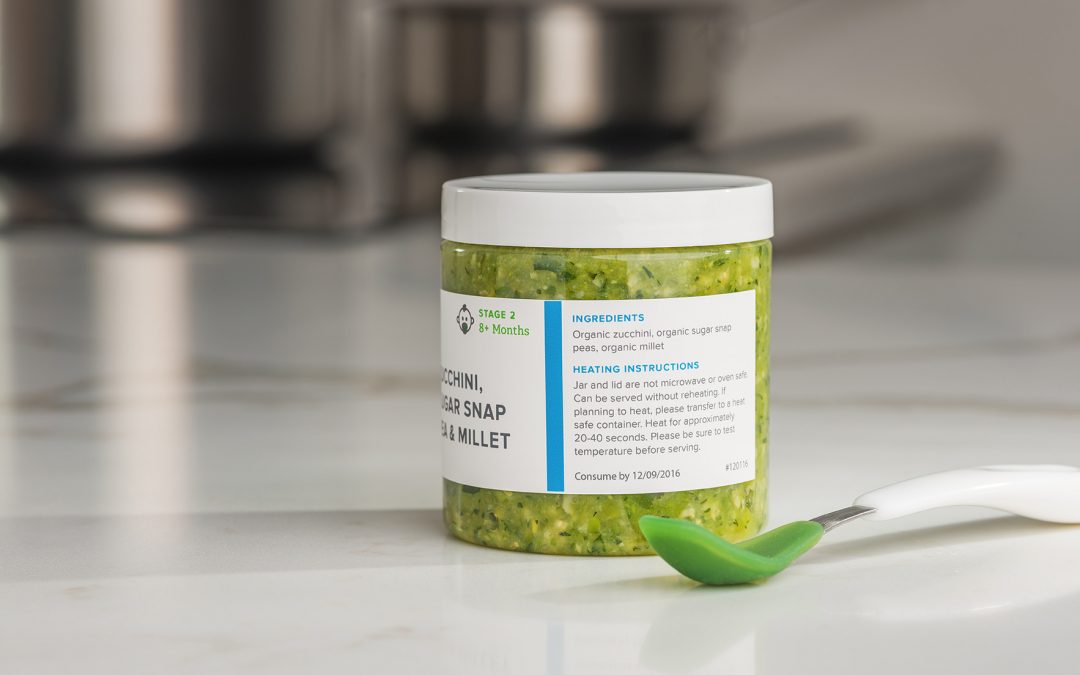By Nancy Weingartner
 When my first child was born I was one of those Moms who cooked, peeled and pureed all the baby’s meals in a hand-operated food mill. By the time baby No. 3 came along, it was all I could do not to put the Cheetos her siblings were munching on through the food mill for dinner. So I sympathize with working mothers who want to provide fresh, organic baby food to their offspring, but don’t have the time or temperament for it.
When my first child was born I was one of those Moms who cooked, peeled and pureed all the baby’s meals in a hand-operated food mill. By the time baby No. 3 came along, it was all I could do not to put the Cheetos her siblings were munching on through the food mill for dinner. So I sympathize with working mothers who want to provide fresh, organic baby food to their offspring, but don’t have the time or temperament for it.
Don’t kid yourself, baby food is big business. Specialty Foods Magazine estimates the baby food market will be $8 billion by 2017, and half of all baby-food launches from 2007 to 2012 were organic companies. And home-made (by someone else) baby food is the latest entry into the food-on-demand hot list.
All the signs are there: Online sales of baby food are increasing—18 percent of parents bought baby food online in 2015, according to BusinessWire Report. Whole Foods, the best known supermarket for organic, is now delivering its baby food free on orders of $10 or more—in one hour, according to its website. But for parents who want to lose the preservatives and additives, farm to baby spoon is the only way to go. And thankfully for them, there’s an appetite for that in the business community.
Already a slew of companies are offering subscription services for freshly prepared food locally, such as Café Baby in Indianapolis, Shoogies nyc (Manhattan and Brooklyn) and Caer and TotPots in Los Angeles. Nurture Life, which started out in Chicago, is one such company looking to go national.
A biz is born

 Nurture Life’s Steven Minisini and Jennifer Chow had senior roles at tech companies and then they had children. “When our oldest started eating solids, we were living in the Bay Area and both working full time,” Chow says. “I didn’t like the shelf life (of most food in supermarkets), but it becomes complex to get the right nutrition.” While she likes to cook, she says, she didn’t want to spend all her evenings in the kitchen making two separate meals. What she did want, however, was to start a company.
Nurture Life’s Steven Minisini and Jennifer Chow had senior roles at tech companies and then they had children. “When our oldest started eating solids, we were living in the Bay Area and both working full time,” Chow says. “I didn’t like the shelf life (of most food in supermarkets), but it becomes complex to get the right nutrition.” While she likes to cook, she says, she didn’t want to spend all her evenings in the kitchen making two separate meals. What she did want, however, was to start a company.
The couple decided other new parents were facing the same challenges, and came up with a solution—a subscription baby food company that caters to children from 1 to 18. Blue Apron, the most popular adult meal-delivery company, was their role model. But unlike Blue Apron, the recipient of their box of food doesn’t have to don an apron and actually prepare it. “Our model is ready to eat,” Chow says.
The child-nutrition market, which is fragmented, was in need of a national player and, “timing is everything,” Minisini says. “Amazon has conditioned all of us.” Now, having almost anything delivered to our door is the norm.
Minisini and Chow tested recipes at home, investigated the supply chain, met with packing specialists and shipping companies and picked the brains of food safety experts.
“When we started this business there were lots of paths to go down,” Minisini says. “We took the expensive way, building a new state-of-the-art facility.” Their first hire was a vice president of culinary who brought a pediatric dietician on board.
Transparency is paramount to a business that ships food to feed children, so the couple spent a lot of time developing systems and standards. “There’s full traceability on everything,” she says. Food is “prepped, cooked, chilled and packaged in approximately 24 hours of arrival” at the child’s home.
Delivery started in the Chicagoland area and as of October expanded to the rest of the Midwest and to the East Coast.
When first launched, the company’s customers were friends and family. To attract subscribers outside their circle, they started a “Founding Families” beta program where they invited parents to opt in for an eight-week period, and have a voice in how the end product shaped up. In exchange, the families received 10 percent off the initial subscription, plus 10 percent off all future orders. Another perk was to be featured on Nurture Life’s Founding Families wall at headquarters. In addition, 4 percent of all sales from the beta program were donated to a charity, Feeding America.
Minisini and Chow were in a position to self-fund their start-up and now 16 months after their launch, they’re evaluating whether or not to take on outside funding. “The market opportunity is enormous,” Minisini says. Could they go faster with a partner?” they muse. Maybe, but taking financing means also taking on partners, a move they’re not sure they’re ready for—although they’re looking at the feasibility of opening a facility on the West Coast.
Founding families aren’t the only ones who get the perks. Minisini and Chow have a personal subscription, but most days they skip the delivery and just take the food home.


